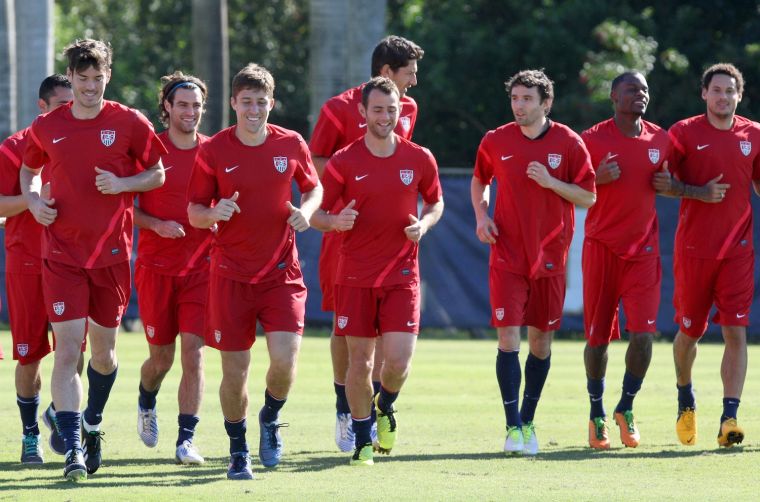Wilson: USA men’s soccer needs better chemistry to qualify for World Cup
February 11, 2013
The U.S. men’s national soccer team’s loss against Honduras in its first World Cup qualifier of the final stage isn’t worrisome.
The 90-degree conditions in San Pedro Sula were brutal and playing on the road in a soccer-crazed Latin American country is never easy, so this defeat isn’t surprising and perhaps should even be the expectation.
There’s no cause for panic. The old idiom to take care of your games on home soil and snatch whatever points you can on the road still holds true, and the Americans should still feel confident that they will qualify for the biggest sporting event in the world.
But how they lost is concerning: The team conceded the majority of possessions and hardly ever threatened offensively en route to a 2-1 defeat to start the six-team Hexagonal round of qualifying from the North and Central American Region known as CONCACAF.
On Wednesday in Honduras, both teams took around the same number of shots, but the U.S. only had two of those attempts on frame.
Most evident during the match was the lack of communication on defense, especially on the Hondurans’ late winning goal. American center back Omar Gonzalez, who had never played in a World Cup qualifying match, displayed some lackadaisical defending to allow Honduras forward Jerry Bengtson to tap the ball into the net for the deciding goal with about 10 minutes left.
These defensive mixups reflect poorly on the team’s organization and coaching.
When he came on as coach back in July 2011, Jurgen Klinsmann promised an appealing style of soccer, a breakaway from what had often been derided as a drole, counter-attack-heavy philosophy relied upon from 2006 to 2011 by former United States coach Bob Bradley.
Style is a long-term issue that can’t be fixed suddenly, but at this point all that should matter is getting results.
And yet, in the four away World Cup qualifiers under Klinsmann, the Americans have taken the lead in all four games only to lose eight of a potential 12 points — a worrisome pattern.
A lack of chemistry in defense isn’t something that’s easily or quickly remedied at the international level, especially when implementing new faces such as Gonzalez and right back Timmy Chandler.
Wednesday’s game was the first World Cup qualifier for both players, so they are raw internationally. They will develop and gain the necessary experience as the 10-game qualifying round continues.
A quote from experienced American goalkeeper Tim Howard about another internationally inexperienced player, Graham Zusi, applies to all of these new players.
“Graham Zusi’s been brilliant for us,” Howard said. “Now we’ll see what it’s like when he gets thrown in the cauldron [of the Hexagonal]. We have no doubts about him, but that’s all part of it.”
The Americans — both young and old — now need to focus on erasing the loss to Honduras from their memories and picking up points in qualifying.
The next qualifier takes place March 22 in Colorado against Costa Rica. In the time between now and then, players will return to their clubs all over North America and Europe and settle back into their roles, which are often different than those they are asked to play for the national team. That is one of the major challenges of international soccer: creating team chemistry, something the Americans appear to be lacking right now.
Immediately following the Costa Rica game is a trip to the cavernous 104,000-seater Azteca Stadium in Mexico City against rival Mexico on March 26. These two games have the potential to cause more trouble for Klinsmann’s squad, and the United States will need to find a way to pick up points to avoid slipping down the qualifying standings.
The top three teams from the Hexagonal automatically qualify for the World Cup in 2014 in Brazil, while the fourth-placed team will play a two-legged playoff against the qualifier from Oceania — probably New Zealand.
The United States still has a good chance at advancing out of this group, but with the strength of CONCACAF continuing to increase — Jamaica’s surprising draw against Mexico, for example — strong performances both home and away are imperative.
The ability is there.
But the team’s form has been sporadic as of late, and what’s going change that?
With the messiah of American soccer, Landon Donovan, on a self-imposed hiatus from the sport until who knows when, the U.S. needs several other players to step up.
Michael Bradley, the team’s stoic central midfielder, appeared nonplussed about the defeat.
“It’s not the way we wanted to start, but it’s a long road. Nobody on our end expects to go 10-0-0, and that’s the reality. There are six good teams, tough stadiums to play in and tough atmospheres. We have to continue to keep a strong mentality, continue to have the confidence and continue to believe that over 10 games, our quality will come out,” Bradley said according to a release issued by US Soccer. “When you’re playing in a situation like this where points are on the line, you never want to start with zero, but you can’t panic. There are nine more games to go. We get a home game next, and we have to look at things, improve things and know that the three points in the next game are crucial.”
Belief is great, but it alone won’t be what gets points and secures a spot for the United States in Brazil next summer.
Write Jasper at [email protected].



